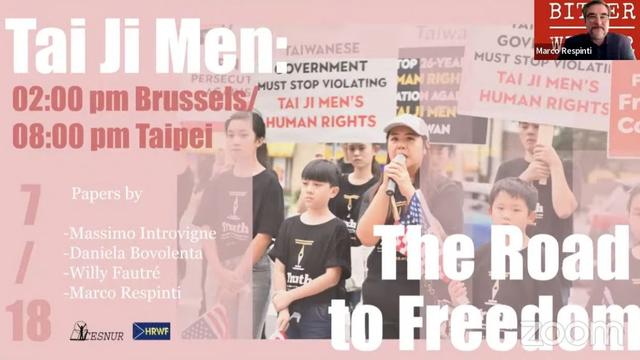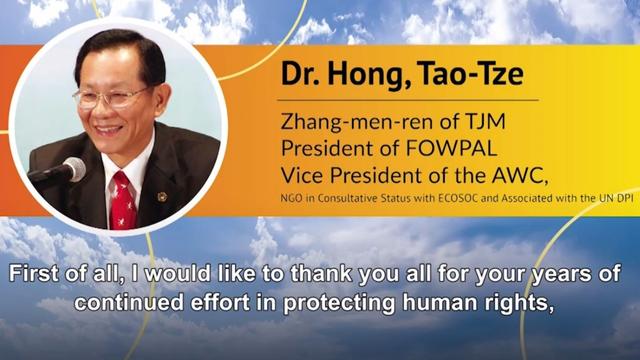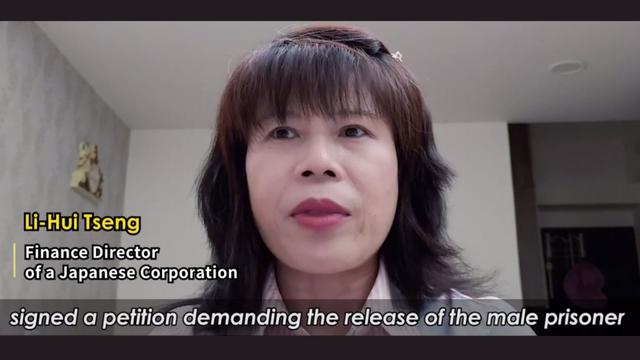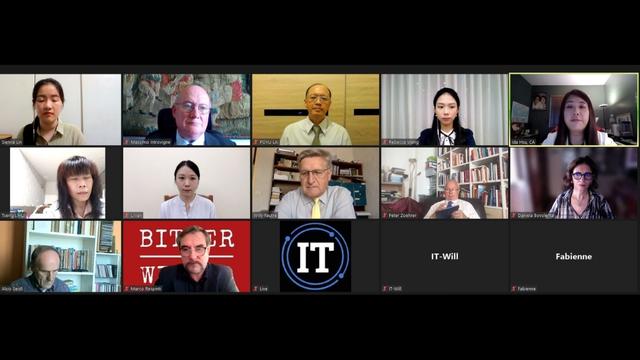On Nelson Mandela day, experts and Tai Ji Men dizi discussed freedom, transitional justice, and the fight for human rights.
by Alessandro Amicarelli

July 18 is the day Nelson Mandela was born in 1918 and is honored in a United Nations day of observance, the Nelson Mandela Day. CESNUR, the Center for Studies on New Religions, and Human Rights Without Frontiers organized on July 18, 2022, one of their bi-monthly webinars on the Tai Ji Men case. The title, “Tai Ji Men: The Road to Freedom,” echoed the title of Mandela’s autobiography “Long Walk to Freedom,” and the 2013 movie derived from it.
Peter Zoehrer, an Austrian journalist who serves as executive director of Forum for Religious Freedom Europe (FOREF), introduced both the webinar and a video with remarks by the founder of Tai Ji Men, Dr. Hong Tao-Tze, on July 13, 2022. The date was the 15th anniversary of Tai Ji Men’s most important legal victory, when Dr. Hong, his wife and three dizi (disciples) were acquitted by a final decision of Taiwan’s Supreme Court from the false charges of fraud and tax evasion. Dr. Hong used the opportunity to insist on the primacy of conscience, forgiveness, and love, which should never be forgotten while fighting for justice and human rights.

Zoehrer also summarized the life of Mandela and explained the history and significance of the Mandela Day as a global day for human rights, freedom, and social justice. Beyond the specific South African experience, the day calls everybody to fight for freedom—which today means fighting for all discriminated minorities, including Tai Ji Men.
Massimo Introvigne, an Italian sociologist and the managing director of CESNUR, who is also Bitter Winter’s editor-in-chief, noted that Mandela’s South Africa and Taiwan share the same problem of transitional justice, i.e. rectifying human rights abuse of a past authoritarian regime, indemnifying the victims, punishing the perpetrators, and telling the truth to citizens.
Introvigne discussed the South African case by looking at the works of William Kentridge, the leading contemporary artist of South Africa, who made transitional justice a key theme of his work. Kentridge showed both the achievements and the limits of post-apartheid transitional justice in South Africa, and found similar problems in post-Communist transitional justice in Russia and Eastern Europe. Although some of Kentridge’s productions were co-financed by Taiwanese institutions, he did not explicitly discuss transitional justice in Taiwan, but Introvigne noted that the Tai Ji Men case demonstrates that the same problems exist there.
In Taiwan, one of the main problem is that the Transitional Justice Commission only deals with human rights violations that happened before 1992, while the Tai Ji Men case, which started in 1996, proves that post-authoritarian abuses continued even after 1992. Introvigne concluded by noting that Kentridge’s idea that transitional justice is not a legal problem only but requires a candid look at memories, feelings, and conscience also resonates with the attitude of Tai Ji Men.
The full video of the webinar.
Daniela Bovolenta, an Italian author and lecturer who frequently writes for Bitter Winter, discussed the question of Mandela’s relationship with Communism, on which a significant literature exists. Irrespective of his attitude to ideology, modern scholars have demonstrated that Mandela was an important member of the South African Communist Party, although for reasons of international politics he later denied it. However, Bovolenta showed how Mandela, while acknowledging the support he had received from Communists in his struggle, later had the intellectual and political courage of looking at the failures and crimes of Communism in Eastern Europe and change his positions, to the point that his left-wing opponents even called him “anti-Communist.”
Bovolenta commented that one of the features of a leading statesperson such as Mandela is being capable of recognizing past mistakes and revising certain positions, which was also proved by his attitude to transitional justice. This is precisely what is not happening in Taiwan, Bovolenta said, where those who persecuted Tai Ji Men and violated human rights of both spiritual minorities and taxpayers are not prepared to publicly admit that they were wrong, apologize, and rectify the consequences of their illegal measures.
Willy Fautré, co-founder and director of Human Rights Without Frontiers, introduced the video “Raining Sky,” where dizi from Taiwan’s Hakka ethnic group advocated for the solution of Tai Ji Men case by singing and dancing.

Fautré explained that the United Nations extended the scope of the Nelson Mandela Day from promoting anti-racism to advocating for humane conditions for those imprisoned everywhere and for human rights throughout the world. Fautré then introduced the testimonies of six Tai Ji Men dizi.
Tseng Li-Hui, finance director of a Japanese corporation, shared her experience of how practicing qigong and self-cultivation with Tai Ji Men helped her overcoming a natural shyness and solving health problems. She put Tai Ji Men’s teaching into practice when she successfully helped her company during the COVID-19 crisis. Tseng also discussed the success of Tai Ji Men martial arts performances in Japan, where they obtained the highest awards. She concluded by reminiscing how Mandela was freed from jail by a concerned international efforts by human rights activists, politicians, and academics, and expressing the hope that a similar global mobilization may lead to a solution of the Tai Ji Men case.

Ida Hsu, who is Vice President of Sales in the company she works with, recalled how she attended earlier this month the International Religious Freedom Summit in Washington DC with her two children aged 9 and 11, respectively. The children initially had doubts whether presenting the Tai Ji Men case at the Summit would really be useful but after witnessing the different events they concluded that gathering so much international support would certainly help the dizi. More importantly, they learned that, just like Mandela in his jail, they are not alone and many in the world admire and try to help Tai Ji Men’s fight for justice.
Poyu (Steven) Lai, audit manager in a global company, noted an interesting coincidence. Mandela spent 26 years (and a half) of his life in jail because of his opposition to apartheid. At the end of this year 2022, it will be 26 years that the Tai Ji Men case is going on in Taiwan. Although the unjust detention of Dr. Hong and his co-defendants, who had been arrested in 1996, ended in 1997, dizi have lived in a psychological and social jail of sort for these 26 years. Because of the false accusations, they have been discriminated and slandered in many different ways. Just as Mandela endured and concluded his road to freedom with victory, Lai hopes that the dizi’s patience and resilience may soon achieve the same result.
Sienna Lin, a graduate student at the Department of Industry and Information Management of Taiwan’s National Cheng Kung University, compared another facet of Mandela’s experience to the Tai Ji Men case. While he was persecuted for more than 26 years, Mandela never reacted with hatred. After his victory, he warned against vengeance and did his best to promote a national reconciliation. In a country, Taiwan, which prides itself of having been recognized by the Economist Intelligence Unit as the first full democracy in Asia, the injustice vested on Tai Ji Men is even more illogical and painful. Yet, Dr. Hong taught dizi never to react with hatred and to continue promoting peace, love, and the primacy of conscience. This was the spirit she brought to Washington DC where she also participated in the International Religious Freedom Summit. She is sure it will bear fruit.

Lilian Lin, a student at the Department of Industrial Design of Taiwan’s Shi Chien University, discussed yet another lesson from Mandela. Several times in his life, it appeared to him and his friends that their struggle was hopeless. Yet, they never gave up hope. They believed in the motto that “if you do not give up hope, hope will not give up on you.” This experience resonates in the story of Dr. Hong and Tai Ji Men. Even when he was being badly mistreated in the detention center, Dr. Hong never gave up his hope that victory would eventually come. This motivated the dizi to continue their international work for peace, love, and conscience even in the darkest days of the persecution, Lin said. They maintain hope that this will indeed be a road to victory.
Rebecca Wang, another Tai Ji Men dizi and a project coordinator, summarized the recent campaigns that led several leading international figures to read Tai Ji Men’s Bell of World Peace and Love, and read a statement sent to the experts dizi met at the Washington Summit, which summarizes the case and has also been published in Bitter Winter.

Marco Respinti, director-in-charge of Bitter Winter, concluded the webinar by stating that most religions and philosophies maintain that humans are born free and loose their freedom for reasons they explain in different ways. But even secular philosophers such as Jean-Jacques Rousseau offer what is after all a secularized version of the idea that God created humans free.
There is, according to title of a 1944 book by Austrian-British economist Friedrich August von Hayek, a “road to serfdom,” where freedom is taken away by states, inter alia through excessive taxes. The “road to freedom” is thus the way to recover the original freedom after the fall into serfdom. Examining the webinar’s papers, Respinti found this dynamics at work in Taiwan, where corruption and tax injustice created a “road to serfdom” that also affected Tai Ji Men. It is now time to advance decisively on a “road to freedom” and reclaim back the liberty—and tax justice—all Taiwanese citizens and Tai Ji Men are entitled to, Respinti said.

The webinar concluded with the ninth episode of “Unbreakable Bonds,” a detailed video story of the Tai Ji Men case.
Source: Bitter Winter

